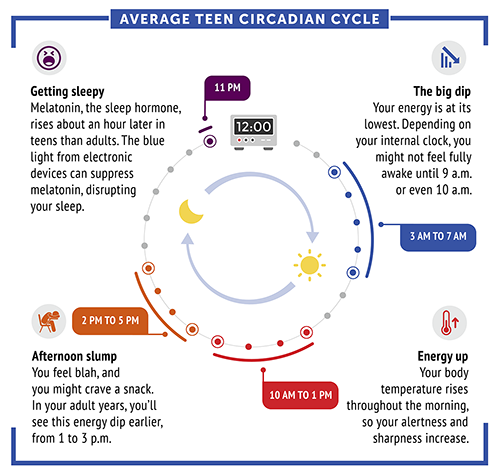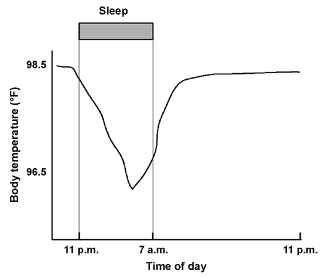Your body has a very smart biological cycle which regulates body temperature to keep us comfortable throughout the day with good health. By understanding our body more we can better prepare to live healthy. Such as, simply keeping ourselves warm to avoid catching cold during the night!
Body temperature cycle – Circadian Rhythms
Your body temperature is a measure of how well your body can make and get rid of heat.1 Normally, our human body temperature range is 36.5–37.5°C (97.7–99.5°F) based on factors like sex, age, time of day, exertion level, health status.2 While the factors seems varied, actually for most people, the sex, age and health status are constants and won’t change drastically. Then, there is a small variation in our human body temperature during the day, in which it follows a 24-hour cycle of our physical, mental, and behavioural changes.3 This is called the Circadian rhythms, where in essence our body slowly raises in temperature after we wake up and onwards until later on the day, slowly dips and into a lower temperature before and after we sleep.

“As part of the circadian rhythm, body temperature generally rises and falls in a daily cycle, reaching its lowest values in the morning and its highest values in the afternoon and evening. The daily cycle of body temperature is a well-established aspect of human physiology that has links to the body’s clock, sleep patterns, metabolism, and other bodily functions.” 4
With low night time body temperature, it is easy to catch a cold during sleep!
When it is about bed time, your body temperature starts to drop and it is easy to catch a cold if you are not ready which will affect health.4 And once you sleep, your body temperature is 1-2 degrees lower than that during the day time. Your breathing, brain activities and metabolism are also slightly different than during the day.

Staying healthy & comfortable during sleep
It is important to get yourself ready for the change. For example:
- Not over exercise and get yourself too warm and excited before bed.
- Don’t drink coffee or anything that will keep you awake.
- Maintain a cooler yet comfortable room temperature in your bedroom, and have a blanket on to prepare for the temperature drop.
References:
- HealthLink BC. (Jun 6, 2022). Body Temperature. HealthLink BC. Retrieved Jul 28, 2022, from
https://www.healthlinkbc.ca/tests-treatments-medications/medical-tests/body-temperature - Wikipedia. (Jul 19, 2022). Human body temperature. Wikipedia. Retrieved Jul 28, 2022, from https://en.wikipedia.org/wiki/Human_body_temperature
- NIH. (Apr 5, 2022). Circadian Rhythms. NIH. Retrieved Jul 28, 2022, from
https://www.nigms.nih.gov/education/fact-sheets/Pages/circadian-rhythms.aspx - Charles Harding, AB, Francesco Pompei, PhD, Samantha F. Bordonaro, MD, Daniel C. McGillicuddy, MD, Dmitriy Burmistrov, PhD, and Leon D. Sanchez, MD, MPH. (Jun 24, 2020). Fever Incidence Is Much Lower in the Morning than the Evening: Boston and US National Triage Data. NIH. Retrieved Jul 28, 2022, from https://www.ncbi.nlm.nih.gov/pmc/articles/PMC7390559/
- Susannah Locke. (Nov 5, 2014). The surprising reason why you get cold when you sleep. VOX. Retrieved Jul 28, 2022, from
https://www.vox.com/2014/11/5/7157163/sleep-cold-temperature
Written by Louis Ng for Intelligence of Care, July 31, 2022
